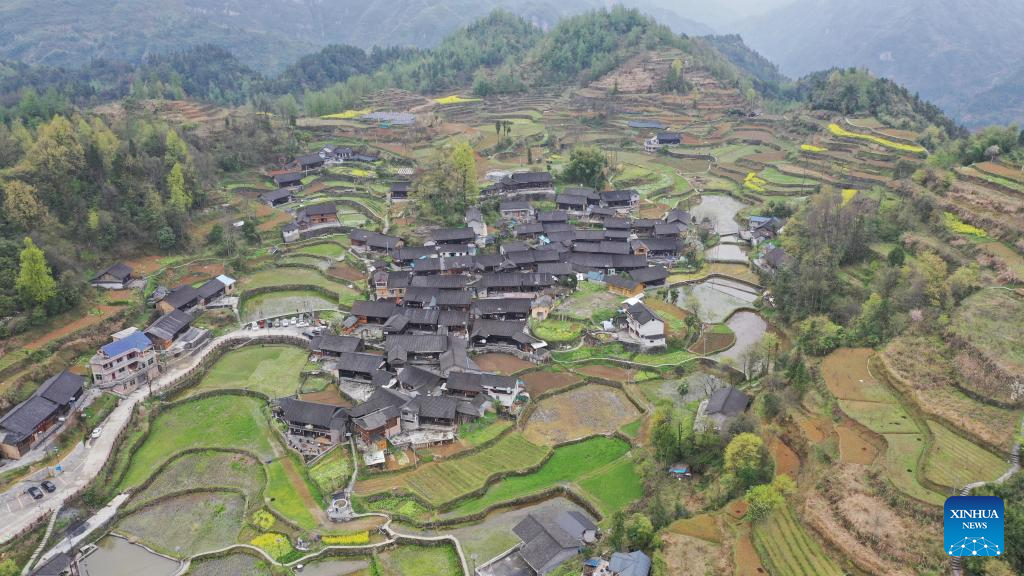
Aerial photo taken on March 27, 2022 shows the view of Jiating Village in Xiangxi Tujia and Miao Autonomous Prefecture, central China's Hunan Province. The Aizhai Bridge which opened to traffic ten years ago in central China's Hunan Province has boosted local tourism and seen income increases of local villagers.
(Xinhua/Zhao Zhongzhi)
CHANGSHA, April 3 (Xinhua) -- The Aizhai Bridge which opened to traffic ten years ago in central China's Hunan Province has boosted local tourism and seen income increases of local villagers.
Located in the Jishou City of Xiangxi Tujia and Miao Autonomous Prefecture, the Aizhai Bridge, spanning over the Dehang Canyon, was built as part of the expressway from southwest China's Chongqing Municipality to Changsha, capital of Hunan, and it has greatly improved the transportation between the two cities.
With a main span of 1,176 meters and built at an elevation of 355 meters from the valley floor, the bridge has set several precedents in China's history of bridge construction, noted Su Qiaojiang, one of the bridge's engineers who works with Hunan Road and Bridge Construction Group Co., Ltd.
Starting from October 2007, it took the construction teams five years to build the bridge by overcoming multiple challenges such as complex geographical conditions and lack of resources, Su recalled.
Local authorities and residents in surrounding villages of ethnic minority groups have explored the mode of combining transportation and tourism advantages brought about by the bridge with targeted poverty alleviation efforts.
Over the years, infrastructures have seen significant improvements, tourists are coming in droves, and local produce has gained huge popularity.
Increasing opportunities have encouraged locals working in faraway places to return to their hometowns. Yang Meikai, 31, is one of them.
Yang was born in Jiating Village in Aizhai Township, a previously impoverished village of the Miao ethnic group tucked away in Dehang Canyon. She used to walk along rugged pathways for nearly three hours to get out of the village. Fortunately, she managed to complete her study at a college in Jishou.
With the increasing number of tourists, households in Jiating Village have embraced growing business opportunities. In 2018, Yang started her own rural-style restaurant in the village and later opened a workshop together with fellow villagers to weave Miao-style clothing.
"By selling Miao-style handmade clothes and other agricultural products, I can earn more than 10,000 yuan (about 1,575 U.S. dollars) a month during tourist season, and the annual income is about 70,000 yuan," Yang said.
Apart from making her own fortune, Yang is also helping other fellow villagers improve their lives. She has established cooperatives to help locals sell vegetables, fruits, tea leaves and handcrafts via various sales channels, with the dividends boosting the incomes of the villagers. ■
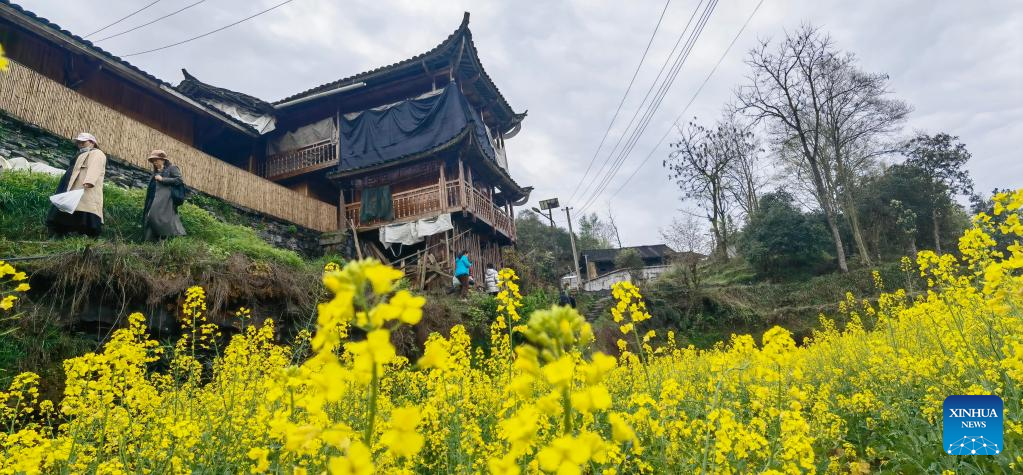
Tourists visit Jiating Village in Xiangxi Tujia and Miao Autonomous Prefecture, central China's Hunan Province, March 27, 2022. The Aizhai Bridge which opened to traffic ten years ago in central China's Hunan Province has boosted local tourism and seen income increases of local villagers.
(Xinhua/Zhao Zhongzhi)
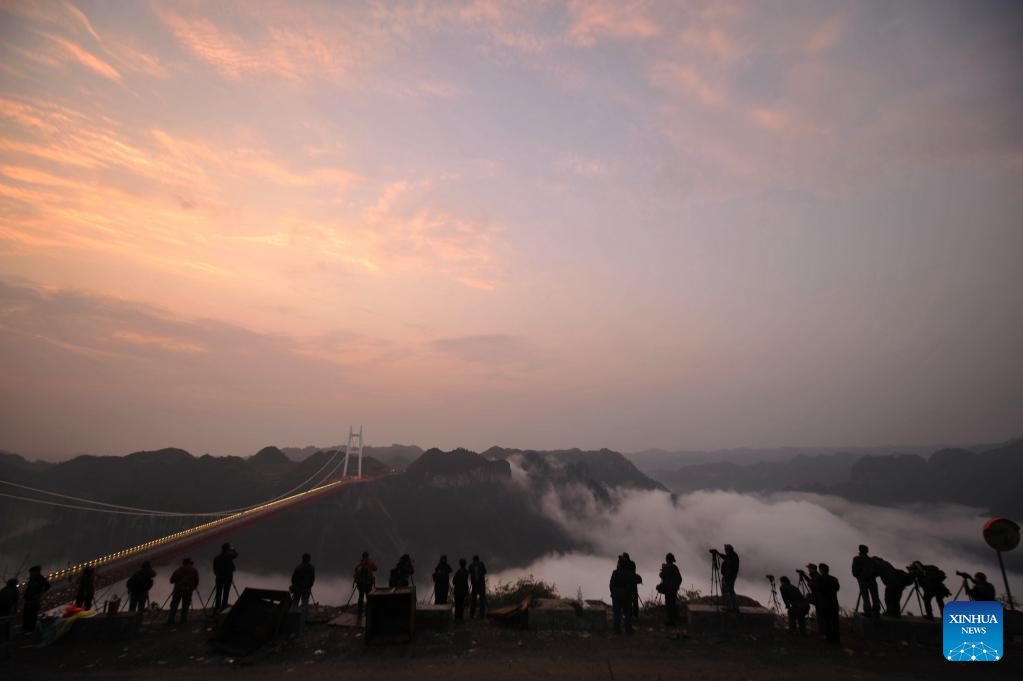
Aizhai Bridge opens to traffic in Xiangxi Tujia and Miao Autonomous Prefecture, central China's Hunan Province, March 31, 2012. The Aizhai Bridge which opened to traffic ten years ago in central China's Hunan Province has boosted local tourism and seen income increases of local villagers.
(Xinhua/Zhao Zhongzhi)
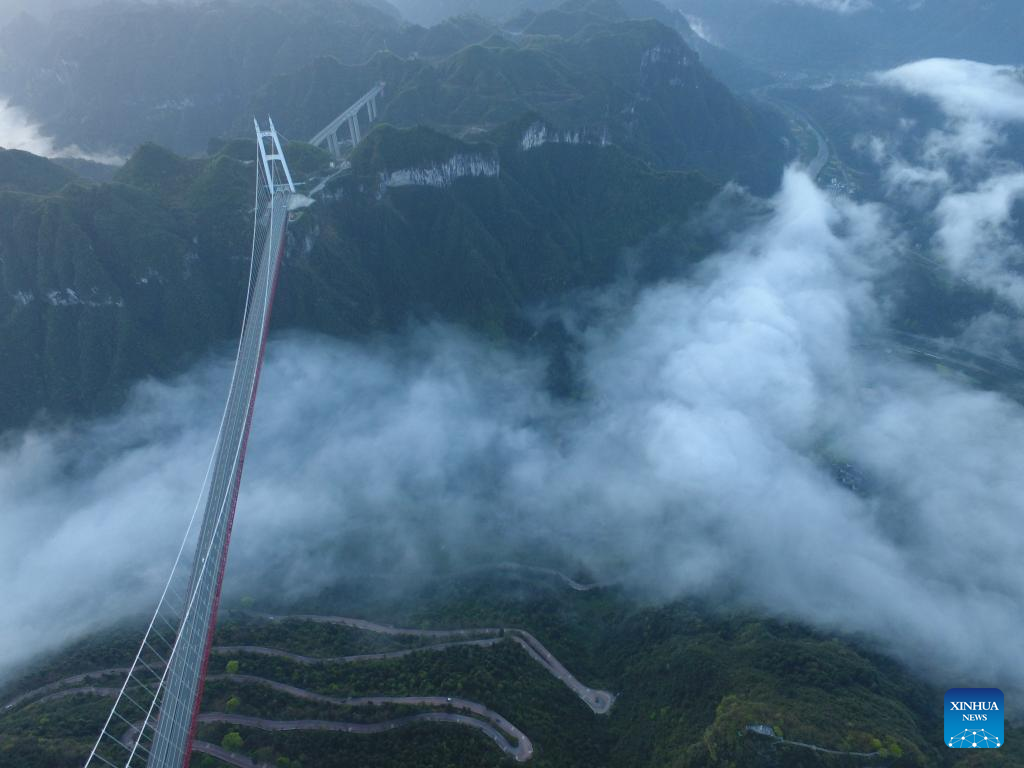
Aerial photo taken on March 28, 2022 shows the view of Aizhai Bridge in Xiangxi Tujia and Miao Autonomous Prefecture, central China's Hunan Province. The Aizhai Bridge which opened to traffic ten years ago in central China's Hunan Province has boosted local tourism and seen income increases of local villagers.
(Xinhua/Zhao Zhongzhi)

Panorama photo taken on March 31, 2022 with a mobile phone shows the view of Aizhai Bridge in Xiangxi Tujia and Miao Autonomous Prefecture, central China's Hunan Province. The Aizhai Bridge which opened to traffic ten years ago in central China's Hunan Province has boosted local tourism and seen income increases of local villagers.
(Xinhua/Zhao Zhongzhi)
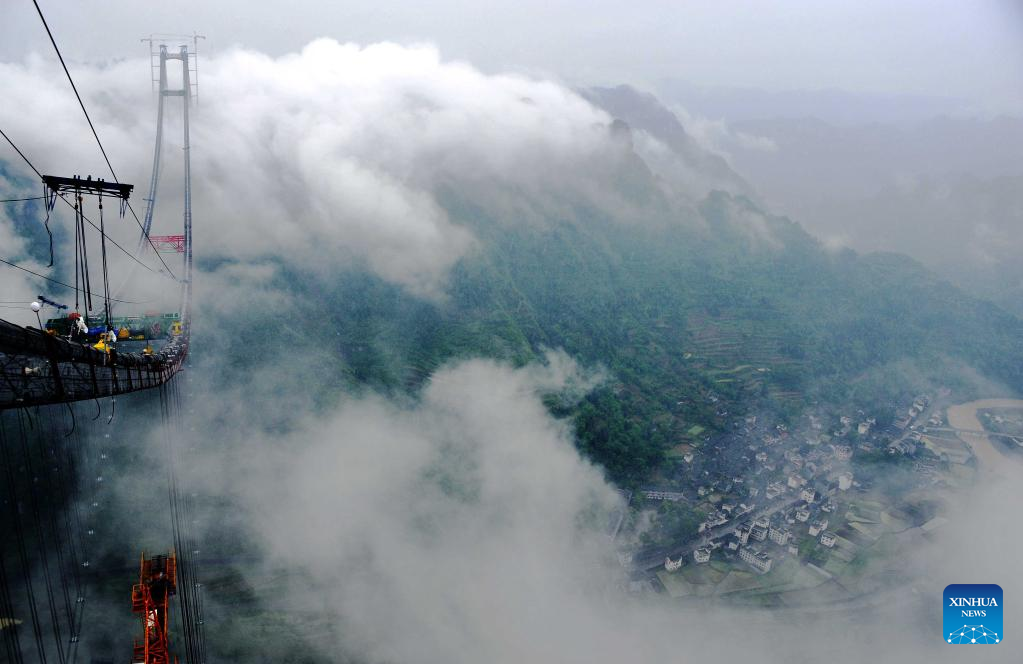
File photo taken on May 2, 2011 shows Aizhai Bridge under construction in Xiangxi Tujia and Miao Autonomous Prefecture, central China's Hunan Province. The Aizhai Bridge which opened to traffic ten years ago in central China's Hunan Province has boosted local tourism and seen income increases of local villagers.
(Xinhua/Zhao Zhongzhi)
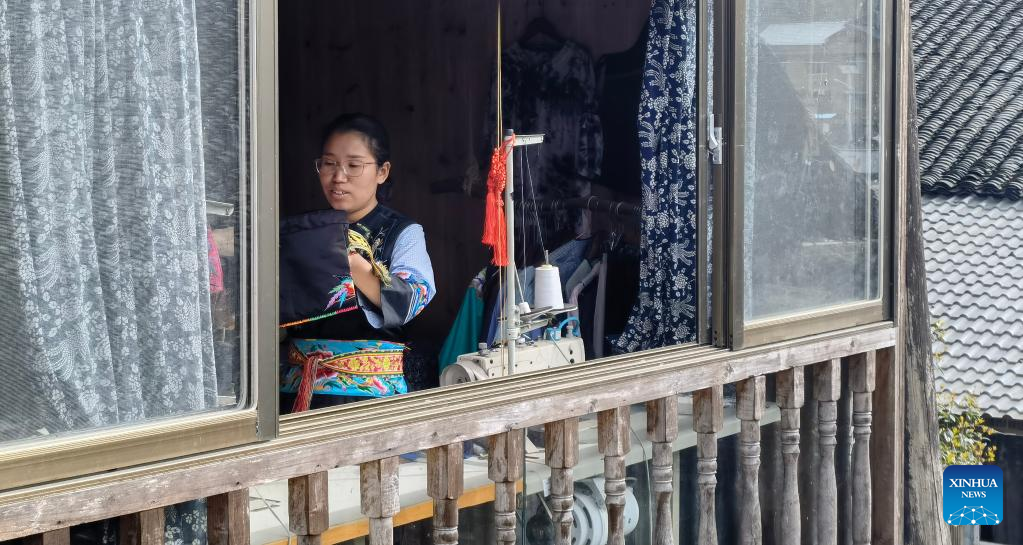
Yang Meikai shows the Miao embroidery to tourists at her home in Jiating Village of Xiangxi Tujia and Miao Autonomous Prefecture, central China's Hunan Province, March 27, 2022. The Aizhai Bridge which opened to traffic ten years ago in central China's Hunan Province has boosted local tourism and seen income increases of local villagers.
(Xinhua/Zhao Zhongzhi)
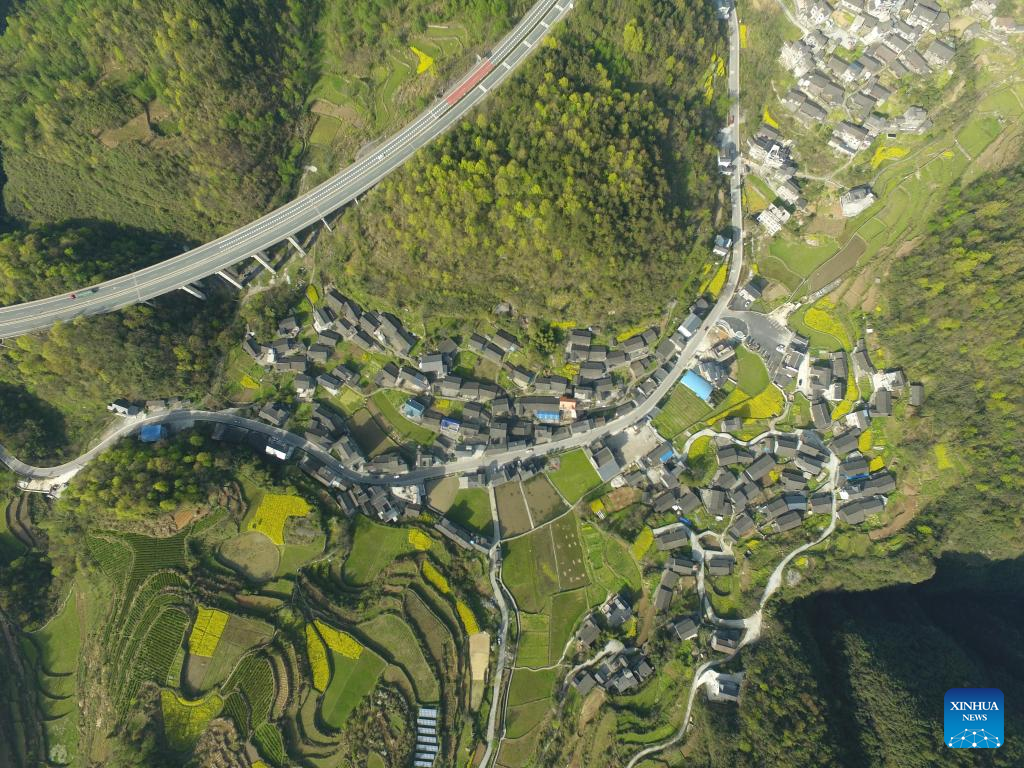
Aerial photo taken on March 28, 2022 shows the view of Xingfu Village in Xiangxi Tujia and Miao Autonomous Prefecture, central China's Hunan Province. The Aizhai Bridge which opened to traffic ten years ago in central China's Hunan Province has boosted local tourism and seen income increases of local villagers.
(Xinhua/Zhao Zhongzhi)
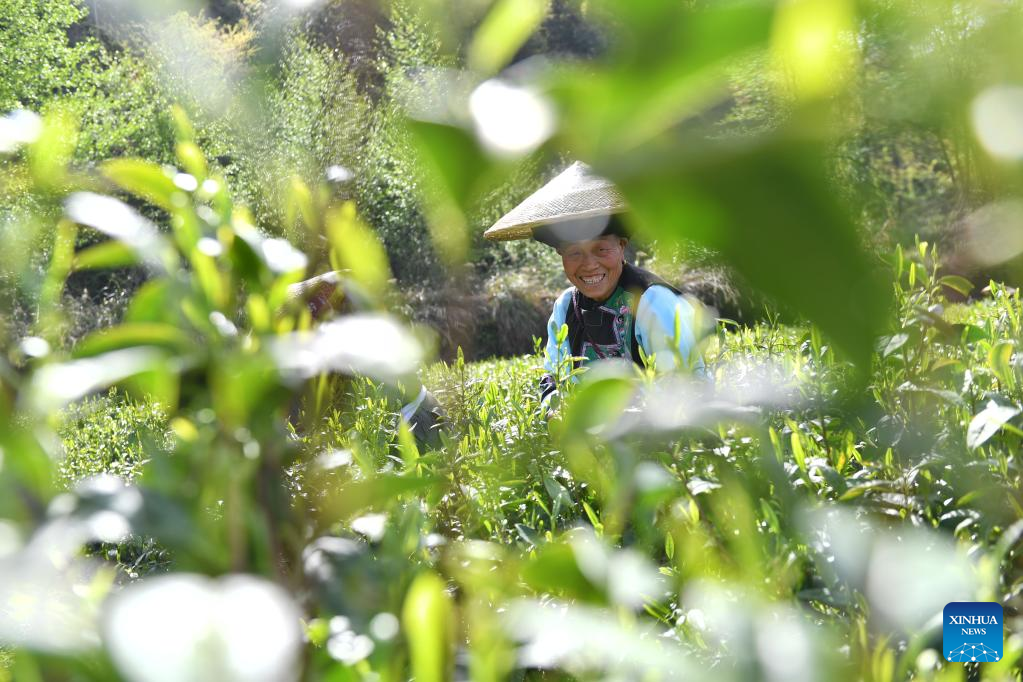
A villager picks tea leaves in Xingfu Village of Xiangxi Tujia and Miao Autonomous Prefecture, central China's Hunan Province, March 28, 2022. The Aizhai Bridge which opened to traffic ten years ago in central China's Hunan Province has boosted local tourism and seen income increases of local villagers.
(Xinhua/Zhao Zhongzhi)
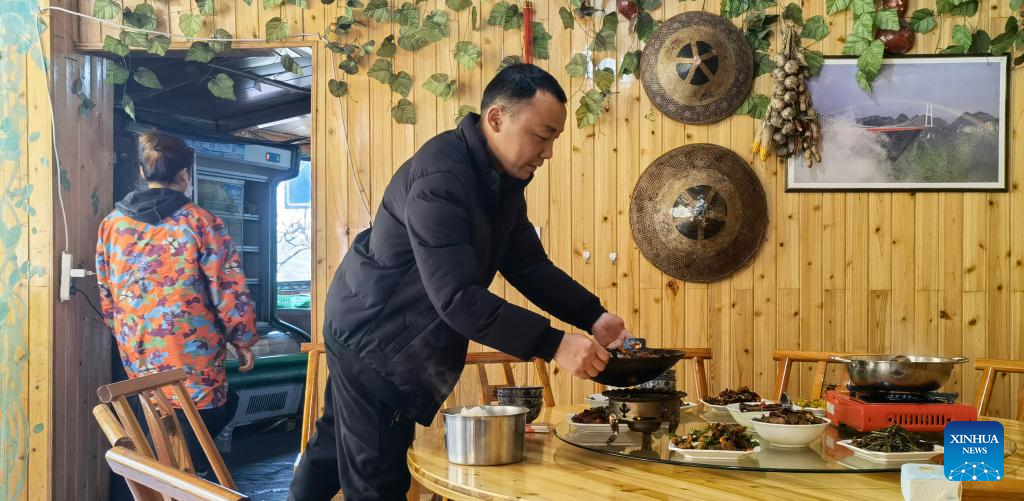
Huang Yong works at his homestay in Xingfu Village of Xiangxi Tujia and Miao Autonomous Prefecture, central China's Hunan Province, March 28, 2022. The Aizhai Bridge which opened to traffic ten years ago in central China's Hunan Province has boosted local tourism and seen income increases of local villagers.
(Xinhua/Zhao Zhongzhi)



